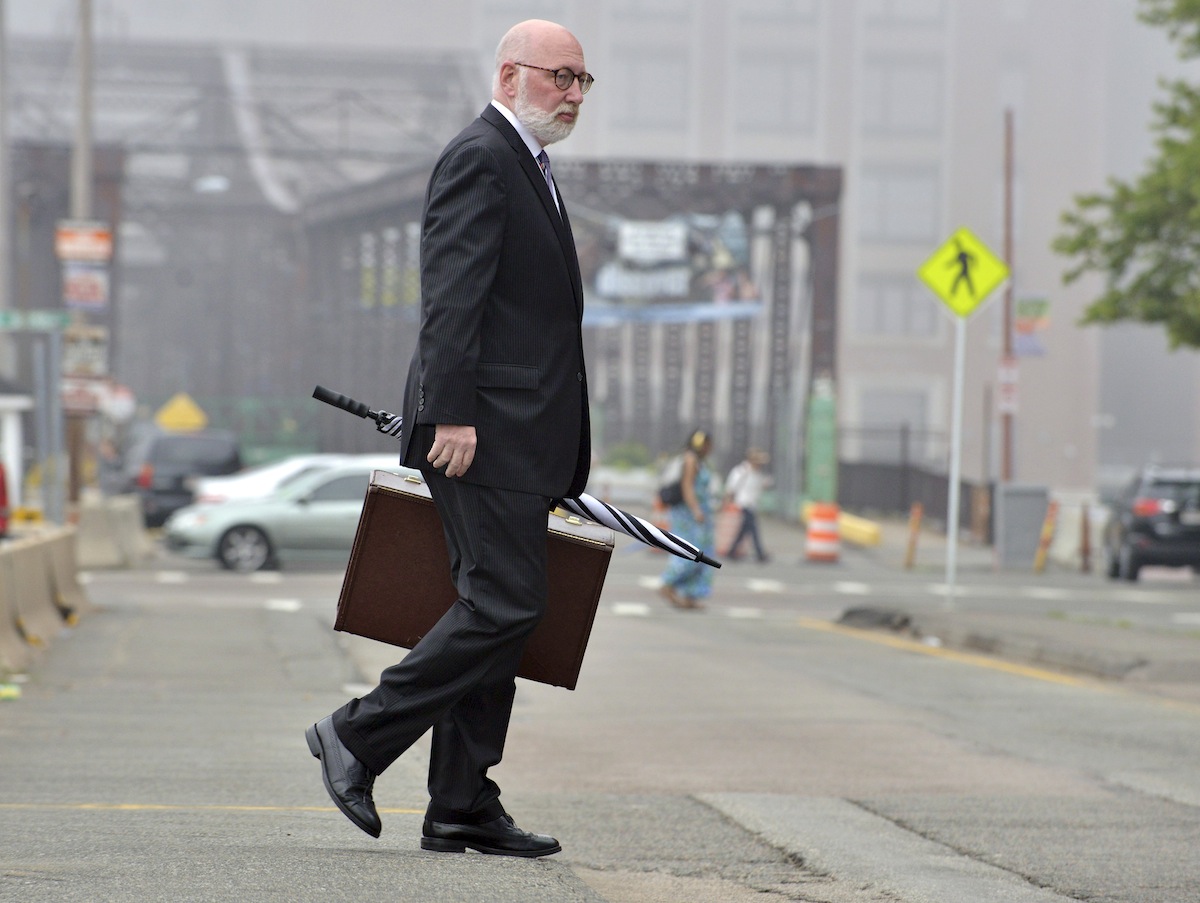Q&A: Director Joe Berlinger Talks About His New Whitey Bulger Documentary

Attorney J.W. Carney, Whitey Bulger’s lawyer / Photo via Associated Press
It took a lot of coordination in a short amount of time, but director Joe Berlinger was able to expedite the creation of his latest documentary—an in-depth look at the infamous trial of convicted mob boss and murderer James “Whitey” Bulger—in just six months, and have it ready in time for its world premiere at this year’s Sundance Film Festival.
“It has been kind of a mad dash,” said Berlinger. “We didn’t start shooting it until June, and to have a film finished in six months and be at Sundance is quite a Herculian effort. It doesn’t normally happen this quickly. But I have always been fascinated by the Bulger story…because of the basic circumstances of his case…and I felt finally I might have something new to add [to it].”
With the red carpet all wrapped up, Berlinger, known for his documentaries like Paradise Lost (based on Salem resident Damien Echols and the murder of three boys in Arkansas), is taking his film on tour and will make his way to Brookline with the main subjects from Whitey: United States of America v. James J. Bulger, on January 30. While in town for the sold-out event, he’ll show his documentary at the Coolidge Corner Theatre, and later take questions from an audience of Boston-area residents that have followed the Bulger case closely in their own backyard.
Speaking from Utah, just days after his film premiered at Sundance, Berlinger reflected on some aspects of the film that he regrets, and talked about what it was like to hear the voice of the nefariously legendary South Boston crime leader, up close and personal:
This was a big trial, and a long time coming. What has been the reaction to the film so far?
Strangely enough, I assumed this was a huge national story, but it’s interesting…some of these [question and answer sessions] have shown me a majority of audiences—there’s a lot of people that just have a passing knowledge of the name Bulger. His name has been largely fictionalized, and there is a distorted view of who Bulger is based on films by people like [Martin] Scorsese. My biggest surprise, I would say, is not all people are aware of the Bulger saga as I had thought.
He’s definitely known in Boston, and the trial was what he called the “big show” of the summer. Being part of that, what were you trying to capture with this film?
The approach of the film is to have a multiplicity of views and allow the viewer to act as a jury member and have their say in the case. It’s a montage about the different points of view [during the case] and his legacy and his history. One of the disappointments of the trial was that certain areas of inquiry weren’t allowed to be heard by the judge, specifically [Bulger’s] immunity claims. That’s not to say I believe in the immunity claims, but every defendant should be allowed to have a meaningful defense. I think people would have liked to hear from Bulger.
I want to make it clear: it’s not a one-sided documentary that’s making an apology for Bulger—nothing could be further from the truth. Bulger is a vicious, brutal killer that deserves to be behind bars, but I think there are some large areas of inquiry, and questions of wider corruption within our institutions and Boston’s institutions of justice that have not been dealt with, and the film allows all parties…to have their say on those issues. I think the film rides the line from delivering the overview of the standard and accepted beliefs about Bulger, but also challenges through the views of the defense some long-held beliefs about Bulger, most notably that he was not an informant.
Do you think that the subject of whether he was an informant should have been covered more during the trial?
I guess one of my disappointments about the coverage of the trial is that the question of whether or not he was an informant was largely dismissed by people covering the trial. Again I want to make it clear…I have tremendous respect in regard for the journalists who did all the groundbreaking work—this film relies on a lot of the groundbreaking work that all these journalists did in bringing a lot of truth to light. But I was simultaneously disappointed that the question about whether or not Bulger was an informant was largely dismissed by the press covering this case as a sideshow issue designed to divert the jury from keeping its eyes on the ball. The question of whether or not he was an informant goes to the heart of this case because this case is about how somebody was allowed to corrupt our institutions of justice.
Does the film fall more on the side that Bulger was an informant, or that he wasn’t?
The film shows both sides to the issue. It presents the point of view that he was an informant, and why people believe he was an informant, and the film also goes into the defense’s view and presents their evidence that he was not an informant, and there’s some pretty compelling evidence to demonstrate that he might not have been an informant.
Another rare tidbit you were able to include in the film was a conversation between Bulger and his attorney, Jay Carney. It’s the first time anyone has really heard more than a few swears from Bulger. What was that like getting that audio, and experiencing that firsthand?
As a longtime follower of this case, one thing that has always struck me about the media coverage that Bulger has generated is that we have never heard from Bulger himself. People have spoken for Bulger, but we have never heard him really, other than in 30-year-old surveillance wiretap audio, and, of course, at the trial they played a couple minutes of phone calls that had been recorded of him talking to his relatives. But both of those, those were all recorded without his knowledge and certainly don’t represent his take on his own narrative, and his own story. For me, I was really excited that the trust and the relationships that I had built over the summer, you know, paid off in this opportunity to really hear form Bulger himself. Again, the film is clearly not saying that everything that comes out of Bulger’s mouth is necessarily true, but it’s fascinating to hear from Bulger and hear his version of events. For anyone who is interested in this case, you don’t have to accept what he is saying as fact, but just to hear from him is fascinating and up for the viewer to decide.
Hearing Bulger talk outside of court, what was your initial reaction? Did you think it was BS, or did you feel compelled to believe a lot of what he said?
I really accept his views at face value as his views, and I don’t try to have a personal opinion of them. I try not to prejudge or judge my subjects. In this, I would say, it depends on the nature of the film and the type of subject. This is a film about how everyone has shaped the Bulger narrative each in their own way, and that is, in many ways, the theme of the film—the ultimate unknowability of the truth, and the need for further investigation into what made Bulger possible. I’m here to prevent everyone’s point a view, and ask that a conversation be sparked to find out what made Bulger possible, and how he was able to reign. U.S. Attorney Carmen Ortiz stood before the press, which is in the film, and said that with the conviction of Bulger this ugly chapter in Boston’s history is over. But is it over? Can it be over if we don’t truly know who is responsible for what went on during this corrupt period? Can it really be over?
You’ve focused on some really high-profile cases that have changed the outcomes of peoples’ lives, most notably Paradise Lost. Do you expect this film to turn up some dirt since you don’t think it’s over?
I have been blessed that a number of my films have had a real impact on the subjects that they cover, but this one is a little more ambiguous in my opinion in its ability to do that. The West Memphis Three were people that were wrongly convicted. I firmly believed in the wrongful conviction. That’s a more tangible advocacy goal: the wrong guys are in prison, let’s do what we can to get them out. But this is not an apology for Bulger. Bulger is where he deserves to be. My goal of this film is to provoke a conversation. I did not accept Carmen Ortiz’s assertion that with the conviction of Bulger that this chapter can be closed. I think that we need a conversation to figure out how to answer these larger issues about how Bulger was allowed to reign, and what is the nature of the corruption, so that this stuff doesn’t happen again. I fear that that’s what’s going to happen. I don’t want this film to change Bulger’s conviction. But this chapter in history is not yet closed.
On the topic of history, at the Sundance Film Festival, you had both Bulger’s defense team and family members of Bulger’s victims together on the red carpet.
The fact that Steve Davis and Jay Carney can stand on the same stage together—I invited the prosecution to attend Sundance, too. I have a very good relationship with them…but they chose not to come to Sundance because I think it’s much bigger deal for U.S. attorneys to take several days off and come to Park City, Utah, for a film they haven’t seen yet. But they are planning on attending the Boston screening. I think the fact that I have an open dialogue with everybody on all sides of the case demonstrates the special nature of this film. This is a film that really embraces that there are multiple narratives about Bulger.
You made this film in six months, and packed a lot into it. Any regrets now that it’s all wrapped up?
The one thing I do regret, and it’s just the nature of cinema and the nature of documentary making, is we obviously don’t go into all 19 victims. In part it was because some people didn’t want to participate in film, and in part because it’s just the nature of film—there’s just so much information you can include in a movie, so I hope that family of victims don’t think we prioritized one story over another, or have taken sides with some family members over others.
What about a scene, or instance, that really stands out for you? Any favorites?
I would say favorite in quotation marks. There are two favorite aspects to the movie, one being that we hear from Bulger himself. I am very proud I was able to convince the defense to allow me to eavesdrop on the conversation. I think one of the more interesting moments of the film—you know, I can’t say I enjoy it—but we were there when Steve Davis got the phone call [during the trial] that Steve Rakes’ body was found. I think that’s a powerful moment, and what’s interesting to me…is that news of his death as it rippled through the courtroom, many longtime observers of this case, including family members, really talked about as a tangible possibility…including members of the press, before it was announced that there was a suspect in the case—rumors swirled…and people were raising as a distinct possibility, Was this the government? Why did he get knocked off?
While I don’t believe the government was involved, and didn’t believe it then, to me it says everything about the faith in the institutions of justice of people involved in this case—that they could allow themselves to believe that the government was even a possibility. The fact that they were so willing to believe that demonstrates how people’s faith in Boston’s law enforcement has been shaken to the core. That’s the larger meaning of this film.


